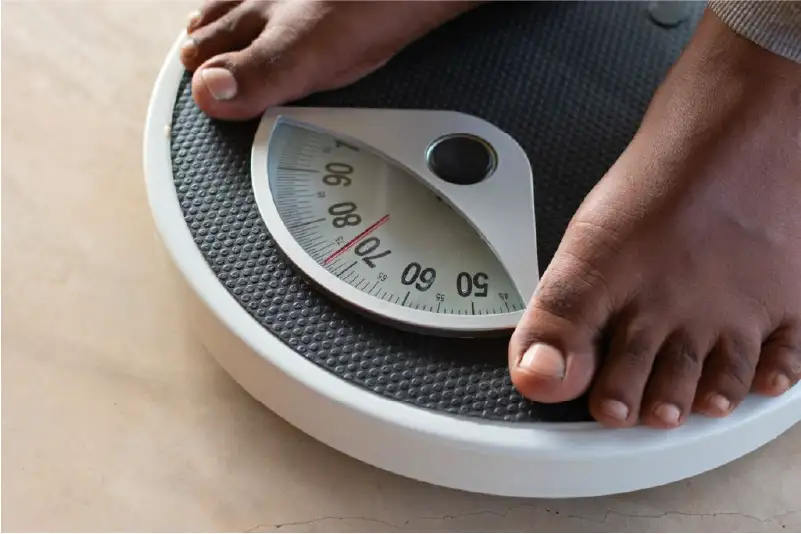Table of Contents Show
You’ve probably heard that eating too much can make you gain weight. But what about eating too little? Can starving yourself or skipping meals actually backfire and cause you to pack on the pounds?
This is a common question that many people have when they are trying to lose weight or improve their health. And the answer is not as simple as you might think.
In this article, we will reveal the surprising truth about Does Not Eating Make You Gain Weight. We will also give you some tips on how to eat enough calories and nutrients for optimal weight loss and health.
Can you gain weight from not eating enough?


When you don’t eat enough calories, your body goes into survival mode. This means that it tries to conserve energy and protect its vital functions. It does this by slowing down your metabolism, which is the rate at which your body burns calories.
A slower metabolism means that you burn fewer calories throughout the day. This can make it harder for you to lose weight or maintain your weight loss.
Not eating enough can also affect your hormones, especially those that regulate your appetite and hunger. When you don’t eat enough, your levels of ghrelin, the hormone that stimulates hunger, increase. This can make you feel hungrier and crave more food.
On the other hand, your levels of leptin, the hormone that signals satiety, decrease. This can make you feel less full and satisfied after eating.
The combination of increased hunger and decreased satiety can lead to overeating or binge eating later on. This can result in consuming more calories than you need or intended.
Not eating enough can also have negative effects on your muscle mass, body fat, and overall health. When you don’t eat enough calories or protein, your body breaks down muscle tissue for energy. This reduces your muscle mass and strength.
Muscle is metabolically active tissue that burns calories even at rest. Losing muscle mass can further lower your metabolism and make it harder for you to lose fat.
Not eating enough can also increase your body fat percentage. This is because when you don’t eat enough calories or carbohydrates, your body depletes its glycogen stores. Glycogen is a form of stored glucose that provides energy for your muscles and brain.
When glycogen is depleted, your body switches to burning fat for fuel. However, this process also produces ketones, which are acidic compounds that can build up in your blood and urine.
Ketones can suppress your appetite and make you feel less hungry. This can make you eat less and lose weight in the short term. However, ketones can also cause dehydration, electrolyte imbalance, nausea, fatigue, bad breath, and other health problems.
Moreover, when you resume eating normally after a period of starvation or severe calorie restriction, your body tends to store more fat than usual. This is because your body tries to replenish its glycogen stores and prepare for future famine.
This phenomenon is known as the “starvation mode” or the “rebound effect”. It can result in gaining back more weight than you lost or even gaining more weight than before.
How Much Should You Eat to Lose Weight?


As you can see, not eating enough can have negative consequences for your weight and health. But how much should you eat to lose weight safely and effectively?
The answer depends on several factors, such as your age, gender, height, weight, activity level, and health goals. However, a general rule of thumb is to eat at least 1,200 calories per day for women and 1,500 calories per day for men.
These are the minimum amounts of calories that most people need to meet their basic nutritional needs and prevent starvation mode. Eating less than these amounts can put your health at risk and sabotage your weight loss efforts.
Of course, these are just estimates and may not apply to everyone. To find out how many calories you need to eat to lose weight, you can use a calorie calculator or consult a registered dietitian.
In addition to calories, you also need to pay attention to the quality and quantity of the foods you eat. You should aim to eat a balanced diet that includes a variety of foods from all the food groups: fruits, vegetables, grains, protein, dairy, and healthy fats.
You should also limit your intake of added sugars, refined grains, processed foods, and alcohol. These foods are high in calories but low in nutrients. They can also spike your blood sugar levels and increase your appetite and cravings.
Here are some tips on how to eat enough calories and nutrients for optimal weight loss and health:
- Eat breakfast every day. Breakfast can help kickstart your metabolism and prevent you from overeating later in the day.
- Eat smaller but more frequent meals. Eating every three to four hours can help keep your blood sugar levels stable and your hunger under control.
- Eat slowly and mindfully. Eating slowly can help you enjoy your food more and feel fuller with less food. Eating mindfully can help you pay attention to your hunger and fullness cues and avoid emotional or mindless eating.
- Drink plenty of water. Water can help keep you hydrated and curb your appetite. Sometimes thirst can be mistaken for hunger, so drinking water before or between meals can help you eat less.
- Snack smartly. Snacks can help you bridge the gap between meals and prevent you from getting too hungry. However, choose healthy snacks that are high in protein, fiber, and healthy fats, such as nuts, seeds, yogurt, cheese, fruits, vegetables, hummus, etc.
- Plan ahead. Planning your meals and snacks ahead of time can help you stick to your calorie budget and avoid impulse eating. You can also prepare some meals or ingredients in advance and store them in the fridge or freezer for later use.
- Track your intake. Tracking your food intake using an app or a journal can help you monitor your calories and nutrients and make adjustments as needed. It can also help you identify any patterns or triggers that may affect your eating habits.
How Does Eating Enough Support Weight Loss and Health?


Eating enough calories and nutrients can support your weight loss and health in several ways, such as:
- Boosting your metabolism. Eating enough can prevent your metabolism from slowing down and help you burn more calories throughout the day. Eating enough protein can also help you build and maintain your muscle mass and strength, which can increase your metabolic rate even further.
- Balancing your hormones. Eating enough can regulate your hormones that control your appetite, hunger, and satiety. Eating enough carbohydrates can also help you maintain your serotonin levels, which can improve your mood and reduce your stress.
- Improving your digestion. Eating enough can promote your digestive health and prevent constipation, bloating, and other gastrointestinal problems. Eating enough fiber can also help you feed your gut bacteria, which can improve your immunity and metabolism.
- Enhancing your performance. Eating enough can provide you with enough energy and fuel for your physical and mental activities. Eating enough carbohydrates can also help you replenish your glycogen stores, which can improve your endurance and recovery.
- Protecting your health. Eating enough can prevent you from developing nutritional deficiencies, which can affect your immune system, bone health, skin health, hair health, nail health, and reproductive health. Eating enough antioxidants, vitamins, minerals, and phytochemicals can also help you fight off free radicals, inflammation, and chronic diseases.
As you can see, eating enough can have many benefits for your weight loss and health. However, eating too much can also have negative consequences. Therefore, it is important to find the right balance between eating enough and eating too much.
How to Find Your Calorie Needs and Balance Your Energy Intake and Expenditure


To find the right balance between eating enough and eating too much, you need to know how many calories you need to eat per day. This depends on several factors, such as your age, gender, height, weight, activity level, and health goals.
To estimate your calorie needs, you can use a formula called the Harris-Benedict equation. This equation calculates your basal metabolic rate (BMR), which is the number of calories you burn at rest. Then, you multiply your BMR by an activity factor that reflects how active you are.
The activity factors are:
- Sedentary: 1.2 (little or no exercise)
- Lightly active: 1.375 (light exercise 1-3 days per week)
- Moderately active: 1.55 (moderate exercise 3-5 days per week)
- Very active: 1.725 (hard exercise 6-7 days per week)
- Extremely active: 1.9 (very hard exercise or physical job)
For example, if you are a 30-year-old woman who is 165 cm tall and weighs 60 kg, and you are moderately active, your BMR is:
BMR = 655 + (9.6 x 60) + (1.8 x 165) – (4.7 x 30) = 1,419 calories
Then, you multiply your BMR by the activity factor:
Calorie needs = BMR x activity factor = 1,419 x 1.55 = 2,199 calories
This means that you need to eat about 2,199 calories per day to maintain your weight.
However, if you want to lose weight, you need to create a calorie deficit. This means that you need to eat fewer calories than you burn or burn more calories than you eat.
A safe and sustainable rate of weight loss is about 0.5 to 1 kg per week. To achieve this, you need to create a calorie deficit of about 500 to 1,000 calories per day.
You can create a calorie deficit by either reducing your calorie intake or increasing your calorie expenditure or both.
For example, if you want to lose 0.5 kg per week by reducing your calorie intake only, you need to eat about 1,699 calories per day (2,199 – 500).
If you want to lose 0.5 kg per week by increasing your calorie expenditure only, you need to burn about 2,699 calories per day (2,199 + 500).
If you want to lose 0.5 kg per week by combining both methods, you need to eat about 1,949 calories per day and burn about 2,449 calories per day (2,199 – 250 + 250).
To track your calorie intake and expenditure, you can use an app or a journal. You can also use a food scale or measuring cups and spoons to measure the portions of the foods you eat.
FAQs about does not eating make you gain weight
Here are some frequently asked questions about not does not eating make you gain weight:
Can you gain weight from not eating enough?
Yes, you can gain weight from not eating enough. This is because not eating enough can lower your metabolism, increase your hunger and cravings, reduce your muscle mass, increase your body fat percentage, and cause a rebound effect when you resume eating normally.
how do i know if i’m eating enough?
Some signs that you may not be eating enough include:
- Feeling tired, weak, dizzy, or faint
- Having headaches, mood swings, or difficulty concentrating
- Feeling cold all the time
- Having dry skin, hair loss, or brittle nails
- Having irregular or absent periods
- Experiencing constipation or bloating
- Getting sick more often or having trouble healing
- Losing interest in food or having a distorted body image
If you experience any of these symptoms, you should consult your doctor or a registered dietitian as soon as possible.
How can I boost my metabolism and burn more calories?
There are several ways to boost your metabolism and burn more calories, such as:
- Eating enough calories and protein. Protein has a high thermic effect, which means it requires more energy to digest and absorb than other macronutrients. Eating enough protein can also help you preserve your muscle mass and strength.
- Doing strength training and high-intensity interval training (HIIT). These types of exercises can increase your muscle mass and metabolic rate, both during and after the workout. They can also improve your insulin sensitivity and glucose metabolism, which can help you burn fat more efficiently.
- Drinking green tea or coffee. These beverages contain caffeine and antioxidants that can stimulate your nervous system and increase your energy expenditure. They can also suppress your appetite and enhance your mood.
- Sleeping well and managing stress. Lack of sleep and chronic stress can lower your metabolism and increase your cortisol levels. Cortisol is a hormone that promotes fat storage and hunger. Getting enough sleep and reducing stress can help you balance your hormones and improve your metabolic health.
How can I prevent binge eating or overeating after not eating enough?
Binge eating or overeating after not eating enough is a common problem that many people face. It can be triggered by physical hunger, emotional distress, or environmental cues. To prevent binge eating or overeating, you can try the following strategies:
- Eat regular meals and snacks. Eating every three to four hours can help you avoid getting too hungry and overeating later on. It can also help you regulate your blood sugar levels and mood.
- Eat mindfully and intuitively. Eating mindfully means paying attention to your hunger and fullness cues, your emotions, and your food preferences. Eating intuitively means honoring your body’s needs and wants without judgment or guilt. These practices can help you enjoy your food more and eat less.
- Eat foods that satisfy you. Eating foods that are high in protein, fiber, healthy fats, and water content can help you feel fuller for longer. Eating foods that are rich in flavor, texture, color, and variety can help you feel more satisfied with less food.
- Avoid restrictive diets or rules. Restrictive diets or rules can make you feel deprived and increase your cravings for forbidden foods. They can also create a cycle of bingeing and purging that can harm your physical and mental health. Instead of following a strict diet or rule, try to adopt a flexible and balanced approach to eating that allows you to enjoy all foods in moderation.
- Seek professional help if needed. Binge eating or overeating can sometimes be a sign of an underlying eating disorder or mental health issue. If you struggle with binge eating or overeating on a regular basis, you should seek professional help from a doctor, a therapist, or a registered dietitian.
Conclusion on does not eating make you gain weight


Not eating enough can make you gain weight in the long run. This is because can not eating enough cause weight gain, can lower your metabolism, increase your hunger and cravings, reduce your muscle mass, increase your body fat percentage, and cause a rebound effect when you resume eating normally.
To lose weight safely and effectively, you should eat at least 1,200 calories per day for women and 1,500 calories per day for men. You should also eat a balanced diet that includes a variety of foods from all the food groups.
You should also exercise regularly, drink plenty of water, sleep well, manage stress, and avoid binge eating or overeating.
By following these tips, you can achieve your weight loss goals without harming your health or happiness.
We hope this article has answered your question about not eating enough and weight gain. If you have any other questions or comments, please feel free to leave them below.
Thank you for reading! 😊




